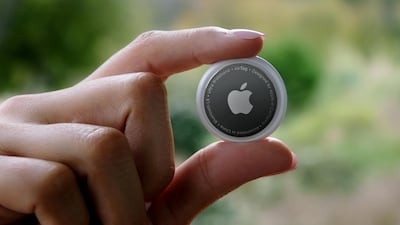Apple's long-awaited AirTag gadget is finally set to arrive on the market after the company showed off the new device at its Spring Loaded event.
The AirTag, in a nutshell, is used to track and find missing items, but here's all you need to know about it so you can decide whether it's going to be worth adding to your Apple collection.
How much does it cost and when is it available?
The all-important question. AirTags can be purchased for $29 for one and $99 for a pack of four, or in the UAE, Dh129 and Dh439.
They can be ordered online from 4pm on Friday, with a launch date of Friday, April 30.
How does AirTag work?
You attach the tag to, say, a handbag, keys or backpack, and it links to Apple's Find My app.
Users can view the item’s current or last-known location on a map. If a user misplaces their item and it is within Bluetooth range, they can use the Find My app to play a sound from the AirTag to help locate it. Users can also ask Siri to find their item, and AirTag will play a sound if it is nearby.
If the AirTag is separated from its owner and out of Bluetooth range, the Find My network can help to track it down.
Apple says the Find My network is approaching a billion Apple devices and can detect Bluetooth signals from a lost AirTag and relay the location back to its owner, all in the background, anonymously and privately.
Worried about losing your bags when travelling? This could be the answer.
What if the AirTag is found by someone else?
They can tap it using their iPhone or any NFC-capable device and they'll be taken to a website that will display a contact phone number for the owner, if they have provided one.
How durable is the AirTag?
It is made of precision-etched polished stainless steel, and is IP67 water and dust-resistant. It has a removable cover to replace the battery. Apple says the tag is designed for more than a year's worth of battery life with everyday use.
Is it customisable?
Absolutely. This is Apple, after all, where accessories are plentiful (though usually don't come cheap).
The AirTag can be personalised with free engraving, including text and a selection of 31 emojis when bought from Apple.
Then there's a Polyurethane Loop ($29), which is both lightweight and durable, and the Leather Loop ($39) and Leather Key Ring ($35), featuring specially tanned European leather.
Furthermore, Apple has linked up with top designer Hermes for "an elegant assortment of handcrafted leather accessories".
The AirTag Hermes range includes the Bag Charm, Key Ring, Travel Tag and Luggage Tag. Hermes accessories will be sold with a custom-engraved AirTag based on the brand’s Clou de Selle signature. Prices are to be confirmed.
Does the AirTag only work with certain iPhones and iPads?
It requires an iPhone or iPod Touch running iOS 14.5 or later, or an iPad running iPadOS 14.5 or later. These software updates will be available starting next week. Customers must have an Apple ID and be signed into their iCloud account.
There's been some controversy around the AirTag ...
Yes, indeed. This issue is that it competes with Tile, a start-up company that has sold a similar device for more than a decade and has testified to US lawmakers that Apple's privacy practices have put Tile's products at a disadvantage.
Tile's chief executive CJ Prober said lawmakers should examine Apple's entry to the tracker tag product category at a US Senate committee hearing where Tile will testify.
"We welcome competition, as long as it is fair competition," Prober said. "Unfortunately, given Apple’s well-documented history of using its platform advantage to unfairly limit competition for its products, we’re sceptical."
Apple said it had recently opened its iPhone's systems to third-party tag trackers in ways that meet Apple's privacy standards.
"We have worked from the very beginning of iPhone to help protect the privacy of users' location data, giving them transparency and control over how all apps may access and share their location," Apple said.
"We have always embraced competition as the best way to drive great experiences for our customers, and we have worked hard to build a platform in iOS that enables third-party developers to thrive.”
Tile will testify on Wednesday before the US Senate Judiciary Committee's antitrust panel.
This month, Apple opened its Find My app to third-party devices. It’s also allowing the makers of third-party devices, such as bicycles and headphones, to integrate location chips to be found by the Find My app without additional hardware.














